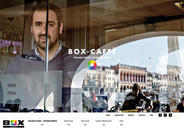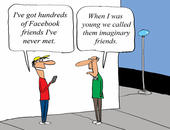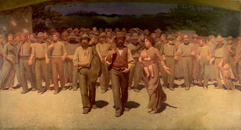Box Caffè, a small, popular restaurant located in Padua’s largest piazza, Prato della Valle, in anticipation of becoming a brand and expanding in Italy and abroad, hired us to design its new corporate image and advertising campaign. In addition to this complex and colorful design job, we present the minimal and rarefied images made for the New York-based photographer Wolfgang Wesener, aka wowe. In the meantime, one of our videos won an award at the Mediastars of Milan.
Socialisms
Recently I went to the theater and sat alongside a young couple, in their thirties or so. It is always strange to see youngsters at Teatro Verdi in Padua, a well-known recreation center for senior citizens. They checked their cell phones throughout the entire play, taking breaks for no longer than ten minutes; it was impossible not to notice. Every so often one of them would type a fleeting message. I wondered what kind of vital information they were exchanging with the world out there, not being able to wait a miserable hour and a half, the time of the play. I wondered, at some point, if something wasn’t happening that would decide the fate of humanity, or the entry into a war or a natural disaster of huge proportions. Once I returned home, I looked online to discover the usual nonsense and that nothing too significant had happened. I must have wanted to simply update their Facebook profiles and share them with their “friends.”
I envisioned the young couple in a different setting, someplace memorable and easier to analyze. I imagined them on a visit to Niagara Falls for the first time. They turn the corner, see the immense roaring wall of the water and immediately take a picture. They take a picture of one another with the waterfall in the background; then activate the self-timer and try to capture themselves with the waterfall; they try several times by changing the angle; they also take a couple of short videos; then they look for a third person who photograph the two of them and the waterfall, again searching for the best angle. Then, while they are still there, in front of the waterfalls, they select a photo, sign into Facebook, write a caption, upload and publish.
And they walk away very satisfied.
Did they really saw the waterfalls? Did they leave swaying in the wave of shock? Did they feel the thrill? The grandeur? The fear? Were they attracted by the spectacle of nature? Did they let themselves be swept away by its majesty?
Why should they? They just wanted to let you know that they were there, and that they were having a crazy good time. In short, they wanted the world to know (friends, relatives, colleagues, acquaintances and others they have never actually met) that they “know how to live the good life.”
I understand that the youth of today has been reduced to this state. However they make me feel a little pain and tenderness, full of all that sterile and confident virtual exhibitionism. And I don’t have a problem with social networks per se; Facebook, for example, is not an absolute evil, when used as a way to revive a memory or connect with long lost friends. It’s the paroxysmal use of social networks that makes them monstrous: in the long run, kids will no longer know what’s real. They won’t perceive reality out of simple disinterest or carelessness, and not as a form of skepticism or intellectual awareness.
Their only real interest, which leads to the neglect of the rest (the reality that is in front of him) is to let others “know” that they are there, in that place, doing that thing. It’s an absurd excess of will to communicate that paradoxically generates a form of autism (decrease of socio-relational interaction) and lack of internal communication, i.e. awareness, which should be at the very foundation of all communication between humans.
Youth super active on the web disturbs me, but a middle-aged man who uses Facebook - and in general all the technological gizmos - the same way young people do, I find it ridiculous.
I was surprised to learn that the masses of older people, and perhaps not altogether destitute, who share their feelings with stereotyped phrases found in chocolate wrappers (as if they all shop at the same chocolate store), in order to share with the world their depth, sensitivity, freedom and beauty. I am struck, for example, by the photos accompanied by evocative phrases or quotes that are highly sentimental or even philosophical, yet entirely devoid of irony. Often what is “posted” is this: a couple smiling in front of something great (a sunset, an exotic place, the dog kennel in the garden), or behind something equally awesome (a cake chock full of candles, a flashy gift or the same dog as before, with the kennel in the garden); images invariably accompanied by a memorable phrase with the accent of the most heartfelt intimacy. Often these phrases start with the word “You’re” in reference to the person in the photo with the author of the phrase.
If we analyze a sweet and meaningful sentence that starts with “You’re” posted online via social networks, there is really a world to discover. First, the value of intimacy. She (let's say that she it’s a women who writes - on average women read and write more than men) turns to him and says, "You’re." It is unquestionably something between them, very intimate; she talks to him with affection, understanding and mutual love. This message takes its value in this most intimate relationship between two people. But when he is no longer sufficient as the receiver of this message, it becomes necessary to let the world know, in a direct and immediate way, the content of their affection, understanding and love. The post will automatically become “pornography” (eroticism is a path of knowledge; pornography a repetition of impersonal and exhibited mechanisms). But not only. It’s as though she is implicitly saying: “You, the recipient of this wonderful message, are not enough for me.” The need for an audience to enter into the intimacy of their lives is proof that the relationship is based on “representation.” Otherwise, if it were sincere and deep, not only would they not feel the need to share it with everyone out there, but, on the contrary, they would feel the urgent need to protect it from the eyes of the world. Experience has shown that the people who really make us happiness are very, very few, and they certainly can’t get close to the hundreds of people we call “friends” on Facebook. And when the couple ends up separating, the dozens and dozens of people who were red with envy due to those wonderfully romantic posts will smile (for the petty but always valuable principle of “trouble shared is a trouble halved”).
Meticulously looking at the world of social networks for the first time (my previous comments are only a small part of a more extensive analysis and concern) I decided that a form of “socialism” has been developing in recent years. Like the one that refers to itself and Marxist thought, this also suggests a radical transformation of society in the sense of equality, which includes everyone, without exception: we are all constantly connected and discussing the same eternal topics. Only that the socialism of Marx was founded on the “suppression of private ownership of the means of production;” this is the most subtle and pervasive “suppression of the intellectual property of the means of discernment.”
15/04/2014 Filippo Maglione












































































